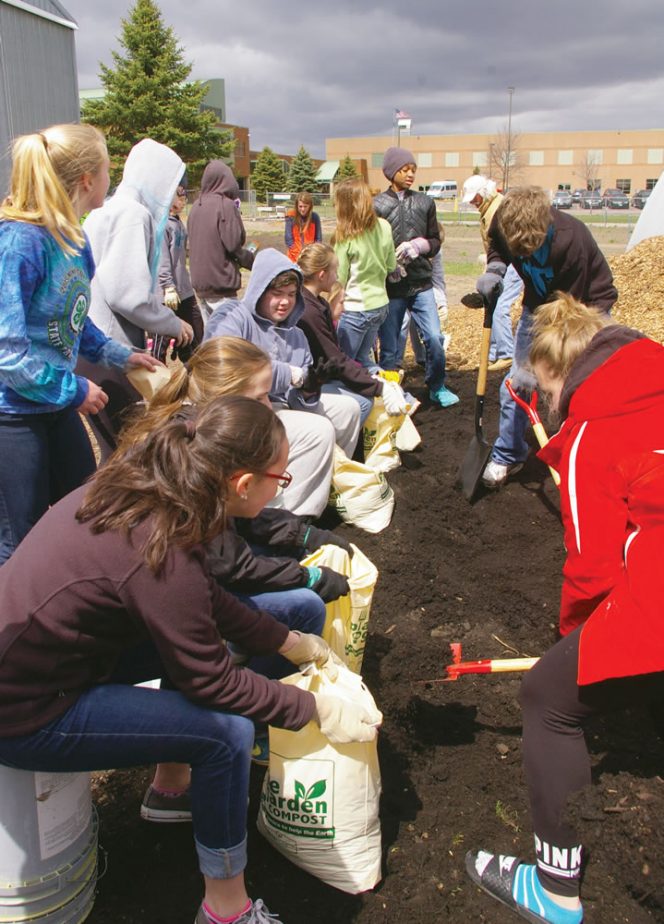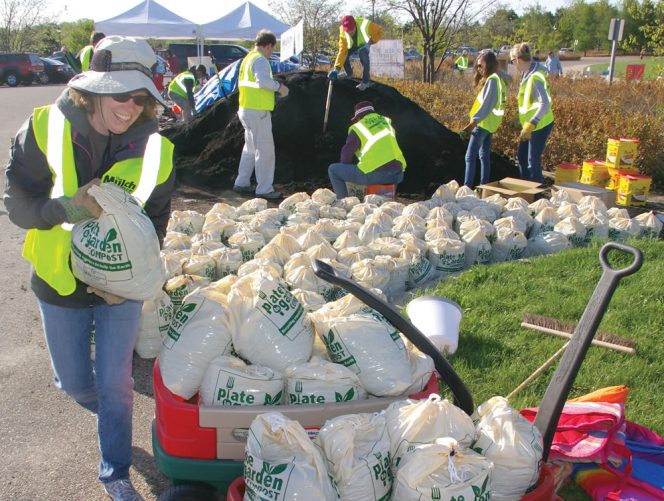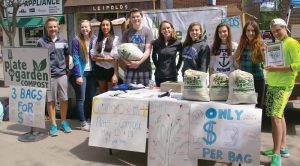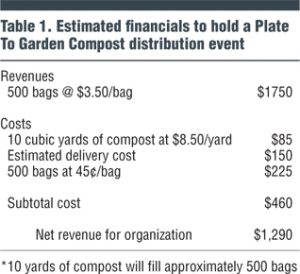Minnesota Composting Council’s Plate To Garden Compost program gives schools and organizations participating in SSO diversion an opportunity to sell finished compost as a fundraiser.
Marcus Zbinden, Anne Ludvik and Jake Duame
BioCycle May 2016

Compost is transported in bulk to the host site. The participating group and their volunteers bag the compost with tools and supplies from the MNCC. Photo courtesy of Carver County
This hands-on experience demonstrates what happens to food scraps once they are collected and delivered to a commercial composting facility. It also provides educational opportunities on the importance of organics recycling, benefits of compost and preventing contamination when collecting organics. It helps increase participation in organics collection by enlightening and motivating participants.
Event Logistics
To host a Plate to Garden Compost event, organizations contact the MNCC. The Council helps plan and market the event, sells the group specially designed bags, and schedules delivery of high quality Seal of Testing Assurance Certified compost from the site which processes the organization’s organic material. (In 2015, all the compost was produced by Specialized Environmental Technologies/The Mulch Store). The compost is transported in bulk from the composting facility to the host site where it is unloaded in a designated area. The participating group and volunteers bag the compost with tools and supplies provided by the MNCC.
Most events distribute between 10 to 15 cubic yards (cy) of compost. The Plate to Garden Compost bags can hold about 20 pounds; 1 cy of compost can fill approximately 50 bags. Organization members sell the bagged compost at their desired price to the public during the event. The host organization is responsible for providing a delivery location for the compost, mobilizing necessary volunteers, promoting the event, cleanup, and coordinating return of borrowed supplies.
Host organizations are billed separately by the compost manufacturer (for the compost and delivery) and the MNCC (for the bags). They often partner with community gardens to take any unsold compost. Table 1 summarizes average costs and profits for a Plate to Garden Compost event. An average sized Plate to Garden event (10 yards of compost or 500 bags) can expect to earn between $1,000 and $1,500 after expenses are paid.

Most events distribute between 10 to 15 cubic yards (cy) of compost. A bag can hold 20 lbs; 1 cy of compost can fill 50 bags. Photo courtesy of Carver County
The event was a huge success in educating fans on the recycling initiatives at the new ballpark. Over 600 bags of compost were given away to fans exiting the stadium. In addition to the compost giveaway, the event also consisted of a website announcement, PA and video board announcements during the game, a radio interview, and a MNCC board member throwing out the first pitch. The MNCC anticipates doubling the number of organizations hosting Plate to Garden Compost events for 2016.

An average sized Plate to Garden Compost event (about 500 bags) can expect to earn $1,000 to $1,500 after expenses are paid. Photo courtesy of Carver County
Project Partnerships
The MNCC’s initial investment in the Plate to Garden Compost program was applied towards purchase of bags, tarps, shovels, banners, and the logo design. The Council continues to offer administrative and financial support in the interest of promoting organics recycling education.
Carver County staff has provided significant staff time to coordinating events, delivering supplies, and designing promotional materials including brochures and press releases, as well as specially designed metal signs. In 2015, the Carver County Environmental Center maintained a supply of compost and the Plate to Garden bags that were available for purchase during the spring and summer months.
Specialized Environmental Technologies (SET)/The Mulch Store sells discounted high quality STA Certified compost to organizations hosting a Plate to Garden event. SET also provided significant staff time for promotion and coordination of events, and the funding to purchase high visibility safety vests for host organizations and volunteers to wear during events. Additional composting facilities, including Full Circle Organics, will be added to the list of compost providers for events in 2016.
The Minnesota Waste Wise Foundation promoted the Plate to Garden program with its members, and members of the Minnesota Chamber of Commerce. They also assisted in coordinating, staffing and promoting several large events.
Groundbreaking New Program
Organics make up the largest portion of Minnesota’s waste stream, with about 900,000 tons generated annually. The primary goal of the MNCC’s Plate to Garden Compost program is to inform and promote expansion of organics collection programs throughout Minnesota via educating the public about organics diversion — and how that contributes to reaching the state’s goal of 75 percent recycling.
By providing the compost in bulk, Plate to Garden Compost participants share in a unique hands-on experience that allows them to see, smell and touch the material while creating an opportunity for conversation and discussion. This is critical since organics collection programs are still in their infancy in the state, and many people are not aware of the benefits of collecting and composting organics. In Carver County, all communities have access to organics/food scraps drop-off at the Carver County Environmental Center. Residents in 7 of the 10 cities in the county have access to subscription organics collection residential organics collection including food scraps and nonrecyclable paper. Haulers can deliver the organics to one of three sites operated by SET, Full Circle Organics and Shakopee Mdewakanton Sioux Community organics composting facility.
Educational programs such as these are a critical tool for solid waste administrators in reaching diversion goals. They also help citizens understand the value of their organics recycling efforts — and assist in developing markets for use of this valuable recycled material. People are given the opportunity to see the direct connection between organics recycling and compost, and they are often amazed that their food scraps and napkins have the potential to become such a valuable product.
In addition the program: Promotes the environmental benefits of compost as a soil amendment; Provides businesses invested in organics recycling the chance to promote environmental awareness and corporate sustainably efforts; Provides compost facilities an opportunity to market their high quality material; and Offers environmentally minded organizations the ability to generate income to fund projects.
Marcus Zbinden is with Carver County Environmental Services, and is Vice Chair of the Minnesota Composting Council and Co-Chair of the USCC Legislative Environmental Affairs Committee. Anne Ludvik is Director of Organics Development at Specialized Environmental Technologies. Jake Duame is a member of the Minnesota GreenCorps program through the Minnesota Pollution Control Agency; he serves the Environmental Department of Carver County, focusing on waste prevention and recycling.











